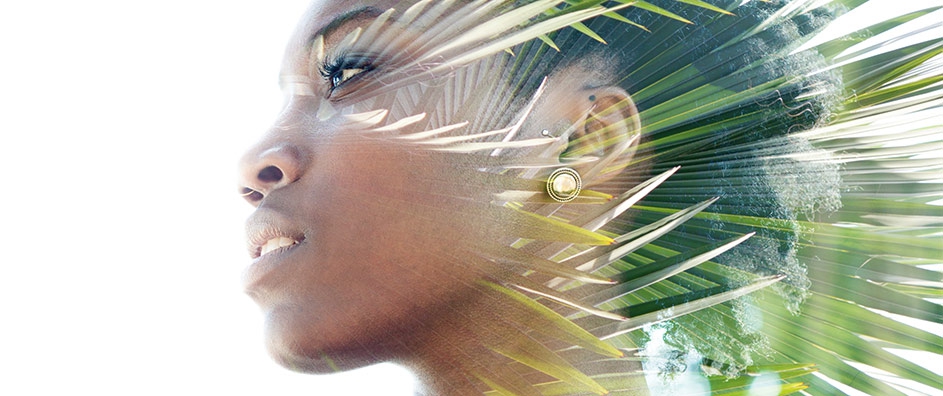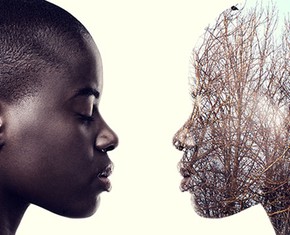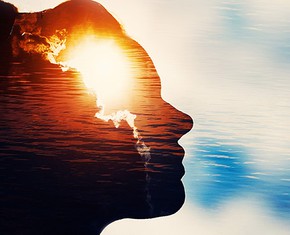The views expressed in our content reflect individual perspectives and do not represent the authoritative views of the Baha'i Faith.
Would you like to live a more balanced life? We probably all would—but how do we get there?
In my previous BahaiTeachings.org essay, I shared brief details about a life-altering spiritual experience that inspired me to write a book called The Middle Theory. Since publishing The Middle Theory I have begun giving talks and workshops internationally about how to live a balanced life–an empowered life guided by a commitment to serving others.
So let’s pick up where we left off (if you haven’t read the previous article in the series, I invite you to do so here). Life is very much like a journey along a path that changes continuously. Sometimes the path is smooth and narrow; sometimes it opens to reveal expansive, inspiring vistas; sometimes the path is bumpy and treacherous; and sometimes it is uneventful or even seemingly pointless.
We are all on the path of life.

When we begin our journey, we always do so with a desire to have a certain experience. Without desire, there would be no purpose to begin that journey, no animating impulse to help us stay the course. What then is the purpose of our lives? Asked differently and perhaps less esoterically, what are we really after on this path we call life?
There is no one-size-fits-all answer. Different people desire different things. Surely there are those who desire happiness and those who desire, more than anything else, wealth and fame. If we choose to be more spiritual in our speculations, we may even speak about desiring enlightenment, fulfilment, self-realization and the like.
Can we whittle down the multiplicity of human desires to one core, overarching desire common to us all? I believe we can. We can discover, if we are willing to temporarily pause our conditioned thinking and allow a deeper awareness to surface within our consciousness, the animating purpose of all human life. Let’s remain open to this possibility, and see where it takes us.
In the Baha’i teachings, we find this incredible statement:
Wert thou to attain to but a dewdrop of the crystal waters of divine knowledge, thou wouldst readily realize that true life is not the life of the flesh but the life of the spirit. – Baha’u’llah, The Book of Certitude, p. 120.
Right away, after reading these majestic words, they guide us to seek a deeper purpose in life beyond the pull of gravity. Our journey, it seems, is not just a material one. We might not have considered this as we set out. On the physical plane, we’re motivated to succeed, achieve, conquer, create, and so on. These desires exist within us all. But if we accept for a moment the truth of Baha’u’llah’s words, they impel us to go deeper. We have to ask ourselves: What is the life of the spirit? How is it different from the life of the flesh? (Going forward, I will use the words “soul” and “spirit” interchangeably.)
Abdul-Baha taught that the soul:
… can discover the realities of things, comprehend their properties, and penetrate the mysteries of existence. All the sciences, branches of learning, arts, inventions, institutions, undertakings and discoveries have resulted from the comprehension of the rational soul. – Some Answered Questions, newly revised edition, pp. 250-251.
But still, we want to know what the soul is, not simply what its capacities are. Like love, there is no single definition that encapsulates the soul. The soul can be defined in many ways. Baha’u’llah describes the soul as:
… a sign of God, a heavenly gem whose reality the most learned of men hath failed to grasp, and whose mystery no mind … can ever hope to unravel. – Baha’u’llah, Gleanings from the Writings of Baha’u’llah, pp. 158-159.
What are we to make of this? Can we possibly believe that our lives are more than our material existence on the physical plane?
Yes, this is the conclusion reached by all the divine educators, the founders of the world’s great Faiths and some of humanity’s deepest thinkers and philosophers. But, even as we read these words and consider their profound implications, our conditioned thinking tries to snap us back into a “reality” we can see, touch, feel and smell. We are often unsure of realms we cannot perceive with our senses. We simply don’t know enough about the soul to speak about it confidently or to know how it functions in our daily lives—so let’s first firm up our understanding of what it means to be human, and what it means to have a soul.
If by definition the human being is a soul manifesting in physical form and utilizing the instrument of the mind to experience life on this physical plane, we cannot truly explore the purpose of our lives without understanding how the soul, body, and mind are associated. To do so would be tantamount to trying to travel from A to B without knowing where A is or where B is. Here’s one proof of the existence of the soul from the Baha’i teachings:
Consider how the human intellect develops and weakens, and may at times come to naught, whereas the soul changeth not. For the mind to manifest itself, the human body must be whole; and a sound mind cannot be but in a sound body, whereas the soul dependeth not upon the body. It is through the power of the soul that the mind comprehendeth, imagineth and exerteth its influence, whilst the soul is a power that is free. – Abdul-Baha, Tablet to Auguste Forel, p. 8.
The soul predates the mind and the body, which means it can exist without the mind and body; however the operation of the mind and the functioning of the body is contingent upon the existence of the soul. If this is true it means you and I are essentially souls—a free power, as Abdu’l-Baha describes it. Even though it seems like we are on a journey on the physical plane, the life journey we are on is primarily a spiritual one.
















Comments
Sign in or create an account
Continue with Googleor